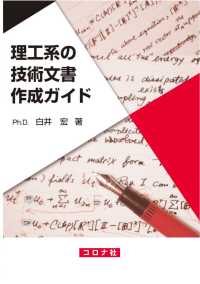Full Description
Science education as currently undertaken in schools is generally too narrow in its conceptualisation and this is a major reason why it fails to engage many young people. This book provides a unified framework for understanding the scope, the purpose and the pedagogies of science education in the settings of school, out-of-school, further education, higher education and lifelong learning. It shows how science education can be reframed in a way that is true to science, true to education and engages with learners, of whatever age.
There are a number of reasons why such a book is timely. For a start, increasing globalisation means that we need a better vision of how science learning in a country can connect to international issues in a way that does not simply involve the importation of Western values and practices. More pragmatically, governments in 'developed' countries are increasingly aware that too many people currently become turned off science during their formative years. At the same time, it is increasingly evident that school science usually does not take enough account of student diversity, particularly with regard to how students learn science and what they find engaging.
There is an urgent need for science education, both inside and outside of schools, to recapture a vision of how we can understand the natural world and how we should wisely and considerately make use of that knowledge. The book therefore is wide ranging yet strongly focused, using examples to illustrate its general points. It draws on writings about epistemology, about the history and philosophy of science, about the nature of learning and the purpose of the curriculum. It critically examines present assumptions about science education, whether stated or not, and propose specific, if sometimes only partial, solutions.
Contents
1. The Situation of Science Education 2. The Nature of Science 3. The Nature of Education 4 The Aims of Science Education 5. Pre-school 6 Primary School 7 Secondary School 8. Formal Post-secondary Education 9. Adult Education 10. Conclusions
-

- 電子書籍
- 記憶喪失の侯爵様に溺愛されています こ…
-

- 電子書籍
- 理工系の技術文書作成ガイド






